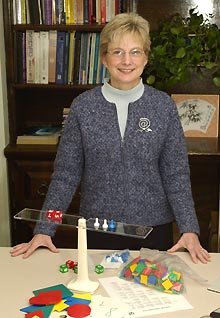|
This is an archived article.
For the latest news, go to the Advance
Homepage
For more archives, go to the Advance Archive/Search Page. |
||
|
Educator Lands Grant To
Promote Advanced Math Skills By Janice Palmer Math can be fun! Sure, try and convince a kid. Kathy Gavin, an associate professor-in-residence in the Neag Center for Gifted Education and Talent Development, believes it is possible and, with a $3 million Jacob Javits grant from the U.S. Department of Education, will spend the next five years proving it. Attitudes and Achievement
"As early as third grade, students develop a feeling for whether or not they are good in math and it sticks with them," says the former elementary and secondary school math teacher. "By the time students reach middle school, many of them believe they cannot succeed in math and are turned off." Gavin believes the present system of teaching math is failing and that recent achievement test scores illustrate the need for change. In international comparisons, American students score far below their peers in other countries, and nationally, the news is bleak. The National Assessment of Educational Progress found only 23 percent of fourth-graders and just 14 percent of high school seniors proficient in math. More troubling are the results for Black and Hispanic students, which indicate that fewer than 50 percent are capable of performing even the most basic of math skills, compared with 75-80 percent of white students. This is why 10 schools of varying socioeconomic levels in Connecticut and Kentucky have been recruited as a vital part of Gavin's research team. Rigorous Research
"One of the reasons at-risk kids have generally not made the kinds of advances that are important is because schools have been focused on a remedial skills approach," he says, "rather than promoting advanced thinking skills." Using a project-based approach, Gavin intends to increase the depth and complexity of math concepts taught in grades three to five. Although high-ability students will be the first benefactors of the research, eventually the curriculum will be adapted for all students at those grade levels. Starting with the third grade level, the team will write the curriculum units, and teachers will work with high-ability students several times a week. Once complete, the curriculum will be used in the general classroom with all students. The team will create 12 curriculum units of advanced math that will include projects and investigations to foster creativity, critical thinking, and problem-solving skills. So, for example, as part of a third grade unit on place value, students will move beyond using tens, hundreds, and thousands. The students will take part in a simulated archaeological dig, where they will discover unusual calculations carved into rock. Using creative problem solving skills, students will be asked to determine what type of place value system was used by these ancient people. "Instead of always lecturing or drilling students, teachers will be encouraged to promote mathematical discourse by guiding discussions and asking questions such as 'Why do you think this works?'" says Gavin. "This is a change of mindset for both teachers and students." She believes that developing a new framework for math instruction is just the beginning: teacher training is a necessity for the program's success. "Often, elementary school math teachers have limited background in the subject," she says. Each summer, the pilot teachers will receive a portion of the needed training in a special institute held during Confratute, the teacher professional development program sponsored by the Neag Center. When these teachers return to their classrooms to implement the new curriculum units, they will continue to receive guidance and technical support from Gavin's team. Eventually, a teachers' guide and professional development modules using streaming video on the Internet will also be developed. For teachers, scaling up material to meet the needs of their top students can be challenging, according to Gavin: "We believe it is much easier to adapt high-level material to meet the needs of all students in the regular classroom," she says, "so we plan to give teachers the resources and the know-how to do that. I think this is the first time this has been done at the elementary school level." Throughout the process, changes in student achievement and attitudes will be measured using a variety of pre- and post-tests and through focus groups involving teachers and students. Teachers will also be assessed. By the end of the fifth year, Gavin says, Project M3 will have had enough time to have been revised, refined, and field-tested and will be ready for national dissemination. "A high-level math curriculum for elementary school students is desperately needed," she says, "and we are excited about being involved in research that is expected to make a national impact." |

